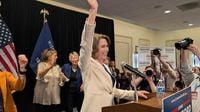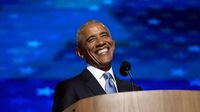In a significant political shift, liberal Susan Crawford has won a seat on the Wisconsin Supreme Court, defeating conservative candidate Brad Schimel in a high-stakes election that has drawn national attention and set records for campaign spending. The election, held on April 1, 2025, will solidify liberal control of the court until 2028, maintaining a 4-3 majority that has crucial implications for issues like abortion rights, labor laws, and congressional redistricting.
Crawford, a Dane County Circuit Court judge, triumphed over Schimel, a Waukesha County Circuit Court judge and former Republican attorney general, by approximately 11 points, according to Decision Desk HQ. This victory is seen as a major win for Democrats and a rebuke of billionaire Elon Musk, a prominent supporter of Schimel who invested over $20 million in the race through his political action committees, Building America’s Future and America PAC.
The Wisconsin Supreme Court has become a battleground for political ideologies, especially as the U.S. Supreme Court has shifted contentious issues like abortion to state jurisdictions. The candidates and outside groups spent nearly $100 million in what has become the most expensive judicial race in American history. Musk's involvement, particularly his financial contributions and controversial tactics, has made him a focal point of criticism from Crawford and her supporters.
“It’s really disappointing to see that, and it is really making people mad,” Crawford told The 19th during a campaign stop on March 22. “What we’re seeing a lot of at these appearances is a reaction to people not wanting to have some outsider billionaire like that come in and try to buy a seat on the Supreme Court.”
The election not only reflects local sentiments but also serves as a litmus test for broader national political trends, particularly in light of President Donald Trump’s narrow victory in Wisconsin in the previous presidential election. Schimel's campaign failed to capitalize on Trump's support, as he could not match the president's vote totals in key areas, including his home county of Waukesha.
Crawford's win signifies the third consecutive Supreme Court election victory for Wisconsin's liberals. Since taking control of the court, the liberal majority has made substantial rulings, including declaring the state's previous legislative maps unconstitutional, thus ending a long-standing Republican gerrymander. The court is also expected to hear a challenge to Wisconsin's restrictive abortion law, which bans nearly all abortions, and could consider the legality of a law that stripped most union rights from public employees.
In a concession speech delivered shortly before 9:30 p.m. on election night, Schimel acknowledged the defeat, stating, “The numbers aren’t going to turn around. Too bad. We’re not going to pull this off.” He urged his supporters to accept the results, despite some initial discontent among them.
The election results were particularly noteworthy in light of the historic voter turnout reported in Milwaukee, where officials stated that seven polling places ran out of ballots due to unprecedented engagement. This turnout is indicative of a growing trend among Democratic voters, especially in urban areas.
National political figures quickly responded to Crawford's victory. Former President Barack Obama congratulated her, tweeting, “Congratulations to Judge Susan Crawford on her victory, and to the people of Wisconsin for electing a judge who believes in the rule of law and protecting our freedoms.” Senator Bernie Sanders echoed this sentiment, emphasizing that Crawford's win was not just a victory over Schimel but also a significant setback for Musk, saying, “Congratulations Wisconsin on electing Susan Crawford. You have set an example for the rest of the country.”
The implications of this election extend beyond Wisconsin. With the Supreme Court's liberal majority, upcoming cases regarding abortion rights and labor laws are poised to shape the political landscape significantly. The court is expected to rule on whether Wisconsin’s Constitution grants women the right to access abortion and to reconsider the state’s congressional district maps, which currently favor Republicans.
Musk's financial influence in the race, which included offering cash incentives to voters for supporting conservative causes, has raised eyebrows and led to accusations of attempting to buy the election. His actions, including distributing $1 million checks to voters at a rally, prompted Wisconsin Attorney General Josh Kaul to sue Musk for alleged vote-buying tactics.
Despite Musk's substantial financial backing, Crawford's campaign successfully mobilized voters concerned about the billionaire's influence in politics. The Democratic Party of Wisconsin capitalized on voters’ alarm at Musk's actions within the federal government, conducting town halls to discuss the potential impacts of his proposed cuts on essential services.
Governor Tony Evers remarked on the election, stating that it reflected the resilience of Wisconsin values and a rejection of outside influence in state politics. “This election was about doing what’s best for our kids, protecting constitutional checks and balances, and defending against attacks on the basic rights, freedoms, and institutions we hold dear,” Evers said.
As Crawford prepares to take her seat on the Supreme Court, she has expressed her commitment to delivering fair and impartial decisions. “Today, Wisconsinites fended off an unprecedented attack on our democracy, our fair elections, and our Supreme Court,” she declared in her victory speech. “Wisconsin stood up and said loudly that justice does not have a price. Our courts are not for sale.”
The outcome of this election signals a potential shift in Wisconsin’s political landscape, providing momentum for Democrats as they look ahead to upcoming elections in New Jersey, Virginia, and the 2026 midterms. As both parties analyze the results, the Wisconsin Supreme Court race will likely serve as a case study in the influence of money and celebrity in local politics.









